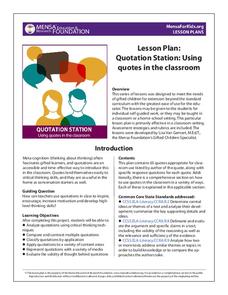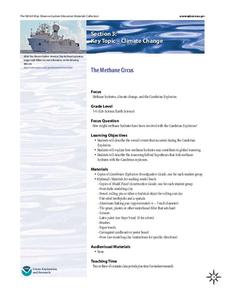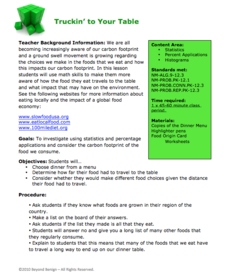MENSA Education & Research Foundation
Quotation Station: Using Quotes in the Classroom
An informative list compiled with quotes, authors, and discussion questions, along with 20 out-of-the-box application ideas, make up the collection of lessons geared to spark dialogue and creative thinking about quotations.
EngageNY
Populations, Samples, and Generalizing from a Sample to a Population
Determine the difference between a sample statistic and a population characteristic. Pupils learn about populations and samples in the 14th portion in a unit of 25. Individuals calculate information directly from populations called...
Science Matters
Landforms from Volcanoes
Three major types of volcanoes exist: cinder cone, composite/strata, and shield. The 18th lesson in a 20-part series covers the various landforms created from volcanoes. Scholars work in pairs to correctly identify the three types based...
Carolina K-12
The Results are In! Examining Our First Vote Election
The 2016 election is over, and now it's time to dig in to some data! An activity revolves around data gathered from the First Vote Project in North Carolina wherein thousands of students voted. After diving in to the data using provided...
NOAA
The Methane Circus
Step right up! An engaging research-centered lesson, the third in a series of six, has young archaeologists study the amazing animals of the Cambrian explosion. Working in groups, they profile a breathtaking and odd creature and learn...
NOAA
Build Your Own Ocean Ecosystem
Hold the sea in the palm of your hand! Amateur oceanographers work together to create models of an ocean ecosystem in the sixth and final installment in a series. Raise awareness of global ocean health issues through guided research,...
Agriculture in the Classroom
"Steer" Toward STEM: Careers in Animal Agriculture
Think like an engineer and an agricultural scientist over the course of 12 lessons in a STEM based unit. Young scientists take on the roles of animal physiologists, animal geneticists, agricultural engineers, animal nutritionists, and...
Beyond Benign
Truckin’ to Your Table
Food takes a trip to the table. Class members choose a meal from a menu and calculate the total cost of the meal including tax and tip. Using a food origin card, pupils determine how far each of the ingredients of a meal traveled to end...
PBS
1000 Words
A picture really can speak a thousand words—no matter how old! Scholars become history detectives as they learn how to analyze historical photos and evidence to uncover the past. The fun hands-on activity makes history come alive through...
Me and My Shadow
Trace My Shadow
Which creates more digital traces: surfing the Internet in a coffee shop, or using an iPhone to send a text message? The answer may surprise you! An interactive resource prompts users to choose which devices, operating systems, and...
Brigham Young University
Understanding the Research Process
The second lesson in a unit on set design focuses on the importance of historical and stylistic research. Working in teams created in the previous session, groups consider what resources they will use as they consider design concepts for...
Reed Novel Studies
Beezus and Ramona Novel Study
What are some of the advantages and disadvantages of having siblings? Pupils explore this topic with the Beezus and Ramona novel study. Additionally, scholars answer questions about chapter one of the time-honored book by Beverly Cleary...
iCivics
Mini-Lesson: Filibusters
How long can you speak without stopping? Scholars analyze the concept of a filibuster in the United States Senate using an installment of the Legislative Branch series of mini-lessons. They research recent filibuster attempts in the...
NASA
The Big Climate Change Experiment Lesson 2: The Influence of Climate on Culture
No conversation about culture is complete without considering climate. Scholars first view videos of climate witnesses who describe the climate in their regions and how climate change affects their daily lives. They then write essays or...
Bonneville
Solar Panel Basics
Going outside is a logical step when dealing with solar panels. Future scientists learn about the n-type and p-type layers of solar cells in the third of 14 lessons in the Cost Effective Solar Cells unit. They go outside to model the...
Curated OER
Solar System Dictionary
Studnets utilize the web site "Little Explorers" to research the solar system. A solar system dictionary is created using the information gleaned from assorted book marked sites.
Curated OER
Eric Carle Author Study
Students view the Eric Carle web page, formulate questions about his work, and e-mail the questions to him. Selections from his book lists are made, art projects created, and communication set up with the author.
Curated OER
A Virtual Adventure In Australia
Students create a magazine highlighting the history and geography of Australia. In this Australia lesson plan, students do online research and other research to create a magazine with articles and advertisements.
Curated OER
Practice Exercises in IT Skills Pack 4: Presentation Graphics
Students explore how to annotate and align clip art as well as create Powerpoint presentations. In this presentation graphics activity, students expand their IT skills set by completing 4 projects employing clip art and presentation...
Curated OER
Flawed Democracies, Human Rights
Pupils create drawing that tell a story about a young girl's life in an internment camp. In this internment camp lesson plan, students hear stories and analyze photographs of internment camps and then create their own drawings.
Curated OER
Writing Serendipitous Fairy Tale Tabloids Using Fairytale News
Learners create tabloid articles based on the story Fairytale Land. In this tabloids lesson plan, students read the story Fairytale Land, discuss the newspaper in the story, and then create tabloid stories.
Curated OER
Fingered Felons
Students examine fingerprints. In this biology lesson, students use sticky tape to create their own set of prints and identify patterns on each of their fingers. Students try to solve a "classroom crime" based on the patterns of a...
Curated OER
Interning Japanese Canadians
Students create a time line of the Japanese Canadian internment of World War II to the apology of the government in 1997. For this World War II lesson plan, students identify historical events in sequence.
Curated OER
Bibliography of Mexico
Students compile bibliographies on Mexico. For this global studies lesson, students investigate appropriate sources regarding Mexico and use the EasyBib web site to create an APA or MLA formatted bibliography.

























